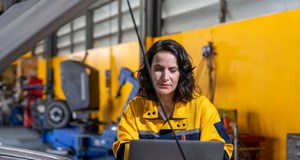Interviews can feel daunting, but preparation can help you feel more confident, calm and in control. One of the best ways to get ready is to practice how you might respond to some common interview questions.
Common Interview Questions (With Tips)
1. Tell me about yourself.
Tip:
Focus on your professional background, key strengths, and what brings you to this opportunity. A simple structure is: Present (what you do now) → Past (how you got there) → Future (why this role excites you)
Example: “I currently work as a parts advisor in the automotive industry. I started out in customer service and moved into a more technical support role because I really enjoy problem-solving and helping people find the right solution. I’m now looking for a role where I can continue building those skills in a larger team environment.”
2. Why do you want this job?
Tip:
Show that you’ve researched the role and the organisation. Focus on what excites you about the job and how it fits your goals or values.
Example: “This role stood out because of your focus on supporting electric vehicle customers-something I’m really interested in. I like that the job blends technical knowledge and customer support, and I think I’d be a great fit for your team.”
3. What are your strengths?
Tip:
Pick 1–2 strengths relevant to the role. Give an example using the STAR method.
Example: “One of my strengths is staying calm under pressure. For example, during a very busy MOT week, our booking system crashed. I coordinated with the service team to manually log bookings and called customers with updates. We managed to get everything back on track by the end of the day.”

4. What’s your biggest weakness?
Tip:
Be honest, but keep it constructive. Show how you're working to improve.
Example: “I used to struggle with saying no, which sometimes led to taking on too much. I’ve learned to manage this by setting clearer priorities and speaking up when my workload gets full.”
5. Tell me about a time you worked in a team.
Tip:
Use the STAR method. Focus on how you contributed, supported others, or overcame a challenge together.
6. How do you handle conflict or disagreement at work?
Tip:
Show emotional intelligence. Focus on listening, staying professional, and working toward a solution.

7. Where do you see yourself in 3–5 years?
Tip:
Share realistic goals that align with the role. You don’t need to have it all figured out-just show growth and ambition.
8. Why should we hire you?
Link your skills and experience directly to the job requirements.
Example: “I have three years of experience in a fast-paced workshop and enjoy hands-on technical problem solving. I also really care about customer satisfaction, which I know is a priority for your team.”
9. Describe a time you made a mistake at work. What happened?
Show accountability and what you learned from the experience.
Example: “I once ordered the wrong part for a customer’s vehicle. I owned up to the mistake, reordered urgently and kept the customer informed. Since then, I always double-check part codes before placing an order.”
10. How do you prioritise tasks when you're busy?
Demonstrate time management and how you stay organised under pressure.
11. How do you stay motivated at work?
Mention personal drivers like learning new skills, helping others, or achieving goals.

12. Tell me about a time you went above and beyond.
Pick an example that shows commitment or initiative.
13. Have you ever had to learn something quickly on the job?
Emphasise adaptability and willingness to step up.
14. How do you handle feedback or criticism?
Show openness to learning and professional growth.
Example: “I used to get flustered when receiving feedback, but now I see it as a chance to improve. I recently had feedback about time management, so I started using a daily task list to keep on track.”
15. What do you know about our company?
Prove you’ve done your homework-mention values, recent news, or why the company stands out.
If you’d like some help preparing for an interview or just want to chat through your options you call us free on 08081 311 333 or chat with us online using the chat function at the top of the page.













